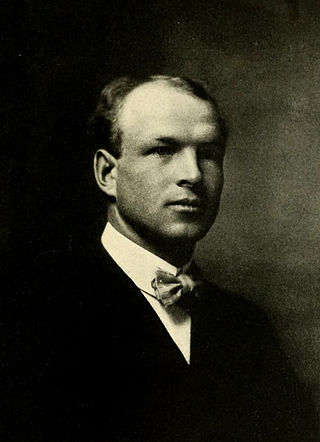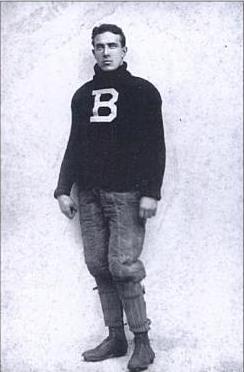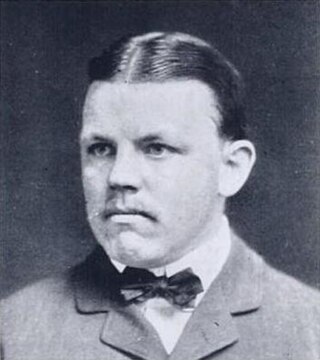Virginius Dabney was an American teacher, journalist, and writer, who edited the Richmond Times-Dispatch from 1936 to 1969 and wrote several historical books. Dabney won the Pulitzer Prize for editorial writing in 1948 due in part to his opposition to the poll tax. In his later years, he was criticized for not standing against Virginia's massive resistance to school integration.

Theta Nu Epsilon is a sophomore class society. Founded at Wesleyan University in 1870 as a chapter of Skull and Bones, the society expanded into a new national organization. It accepts members regardless of their fraternity status.
Frank Loucks Hereford Jr. was the president of the University of Virginia from 1974 to 1985. He died in 2004 at the age of 81. Among the hallmarks of his presidency were a major capital campaign, which increased the university's endowment from $97 million to more than $250 million; and ending the traditional Easters Weekend party.

The Virginia Cavaliers football team represents the University of Virginia (UVA) in the sport of American football. Established in 1887, Virginia plays its home games at Scott Stadium, capacity 61,500, featured directly on its campus near the Academical Village. UVA played an outsized role in the shaping of the modern game's ethics and eligibility rules, as well as its safety rules after a Georgia fullback died fighting the tide of a lopsided Virginia victory in 1897.

Robert Roswell "Buster" Brown was an American football player, coach of football, basketball, and baseball, and college athletics administrator. After playing college football at Dartmouth College, he coached football teams at Virginia Tech, North Carolina, Washington and Lee, and Tulane. In 1910, he moved to Roswell, New Mexico, where he served for more than 25 years as the football coach and athletic director at the New Mexico Military Institute.

John Burton Rix was an American football and basketball player and coach. He served as the head football coach at Austin College (1909–1910), Southwestern University (1914–1916), Southern Methodist University (1917–1921), the University of Miami (1929), compiling a career college football coaching record of 39–34–11. Rix was also the head basketball coach at the University of Texas at Austin (1911–1912) and at Southern Methodist (1917–1921), tallying a career college basketball mark of 29–37.

Thomas Austin Barry was an American college football coach and player, lawyer, and industrial adviser. He served as the head football coach at Tulane University, the University of Notre Dame, the University of Wisconsin, and the University of Denver. Barry attended Harvard Law School and Brown University, where he played on the football team and was named an All-American in 1902.

Claude M. "Little Monk" Simons Jr. was an American football player, coach of football, basketball, and baseball, and college athletics administrator. He played college football at Tulane University, where he starred for the Tulane Green Wave as a halfback. Simons served as the head football coach at Transylvania University from 1935 to 1937 and his alma mater, Tulane, from 1942 to 1945, compiling career college football coaching record of 24–29–2. He was the basketball coach at Tulane from 1938 to 1942, tallying a mark of 19–44. He also had two stints the school's baseball coach, from 1938 to 1941 and 1943 to 1949, amassing a record of 91–69. Simons was the athletic director at Tulane from 1946 to 1947. He was inducted into the College Football Hall of Fame as player in 1963.

Andrew Henry Sommerville was a 19th-century Major League Baseball pitcher, physician and college football and baseball coach. As a pitcher he appeared in one game for the 1894 Brooklyn Grooms, giving up six runs in one-third of an inning while walking five batters. He served as the head football coach of Tulane University from 1900 to 1901 and the head baseball coach in 1902.

John Edward Lombard was an American college football coach and player, professor, education official, and engineer. He served as the head coach of the Tulane University football team in 1898. Lombard attended Tulane University, where he organized the school's first football team and served as its captain.
Harry Wililiam Baum was an American college football coach and construction engineer. He served as the head coach at Tulane University in 1896. Baum attended the University of Illinois, where he played on the football team as a halfback.

Harris Taylor "Pop" Collier was an American college football coach. He served as the head coach for Tulane (1899) and Georgia Tech (1900). Collier attended the University of Virginia, where he played on the football team and served as the team captain in 1898.
The 1902 Tulane Olive and Blue football team was an American football team that represented Tulane University as a member of the Southern Intercollegiate Athletic Association (SIAA) during the 1902 college football season. In their first year under head coach Virginius Dabney, the team compiled an overall record of 1–4–2.
The 1899 College Football All-Southern Team consists of American football players selected to the College Football All-Southern Teams selected by various organizations in 1899. The "Iron Men" of Sewanee won the SIAA championship. The Vanderbilt Hustler remarked on Suter's selection of 9 of his own players, "Only nine! He surely must have been thinking of a baseball team."

The 1900 College Football All-Southern Team consists of American football players selected to the College Football All-Southern Teams selected by various organizations in 1900. Clemson won the SIAA championship. Most said Virginia ranked best in the south.

The 1906 College Football All-Southern Team consists of American football players selected to the College Football All-Southern Teams selected by various organizations for the 1906 Southern Intercollegiate Athletic Association football season. For some, the SIAA champion 1906 Vanderbilt Commodores football team made up the entire team. It would produce eight of the composite eleven. Owsley Manier was selected by Walter Camp third-team All-American. Vanderbilt won the SIAA championship.
The 1900 Virginia Orange and Blue football team represented the University of Virginia as an independent during the 1900 college football season. Led by second-year coach Archie Hoxton, the team went 7–2–1 and claims a Southern championship. The team was captained by tackle John Loyd. The Orange and Blue defeated Sewanee, to give the Tigers its first loss since 1897.

Fraternities and sororities at the University of Virginia include the collegiate organizations on the grounds of the University of Virginia in Charlottesville, Virginia. First founded in the 1850s with the establishment of several fraternities, the system has since expanded to include sororities, professional organizations, service fraternities, honor fraternities, and cultural organizations. Fraternities and sororities have been significant to the history of the University of Virginia, including the founding of two national fraternities Kappa Sigma (ΚΣ) and Pi Kappa Alpha (ΠΚΑ).













